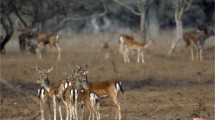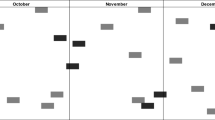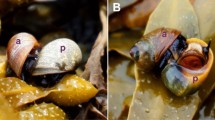Abstract
Red colobus are one of a small number of primate species in which females have been reported to transfer between breeding groups more commonly than males1–3. Several authors have hypothesised that in such species transference may serve to reduce the risk to females of producing offspring of lower fitness through inbreeding1–6. The hypothesis offers no explanation of why females rather than males are responsible for outbreeding in these species, but remains plausible so long as male membership of breeding groups is relatively stable; for once members of one sex have evolved dispersal mechanisms reducing the risk of inbreeding, pressures on the other sex to do likewise will be lowered5. Hence, if both sexes commonly migrate, the hypothesis is weakened. I describe here the membership dynamics of a group of Tana River red colobus, Colobus badius rufomitratus, which provide the first evidence of high rates of membership turnover by both sexes in primates, and speculate that the function of female transference in this case may be related to mate choice and the avoidance of infanticide.
This is a preview of subscription content, access via your institution
Access options
Subscribe to this journal
Receive 51 print issues and online access
$199.00 per year
only $3.90 per issue
Buy this article
- Purchase on Springer Link
- Instant access to full article PDF
Prices may be subject to local taxes which are calculated during checkout
Similar content being viewed by others
References
Kawanaka, K. & Nishida, T. Symp. Fifth Congr. Int. Primat. Soc. 173–186 (Japan Science Press, Tokyo, 1975).
Harcourt, A. H., Stewart, K. S. & Fossey, D. Nature 263, 226–227 (1976).
Struhsaker, T. T. & Leland, L. Adv. Stud. Behav. 9, 159–228 (1979).
Itani, J. Primate Socialization (ed. Poirier, F. E.) 165–172 (Random, New York, 1972).
Clutton-Brock, T. H. & Harvey, P. H. in Growing Points in Ethology (ed. Bateson, P. P. G.) 195–237 (Cambridge University Press, 1976).
Harcourt, A. H. Z. Tierpsychol. 48, 401–420 (1978).
Marsh, C. W. Folia primat. (submitted).
Clutton-Brock, T. H. Nature 250, 539–542 (1974).
Strusaker, T. T. The Red Colobus Monkey (Chicago University Press, 1975).
Siegel, S. Nonparametric Statistics (McGraw-Hill, New York, 1956).
Verner, J. & Willson, M. F. Ecology 47, 143–147 (1966).
Sugiyama, Y. Primates 6, 381–418 (1965).
Hrdy, S. B. Folia primat. 22, 19–58 (1974).
Rudran, R. Folia primat. 19, 166–192 (1973).
Struhsaker, T. T. Z. Tierpsychol. 45, 75–84 (1977).
O'Donald, P. Heredity 17, 541–552 (1962).
Author information
Authors and Affiliations
Rights and permissions
About this article
Cite this article
Marsh, C. Female transference and mate choice among Tana River red colobus. Nature 281, 568–569 (1979). https://doi.org/10.1038/281568a0
Received:
Accepted:
Published:
Issue Date:
DOI: https://doi.org/10.1038/281568a0
This article is cited by
-
Female dispersal patterns influenced by male tenure duration and group size in western lowland gorillas
Behavioral Ecology and Sociobiology (2020)
-
How monkeys see a forest: genetic variation and population genetic structure of two forest primates
Conservation Genetics (2015)
-
Male Homosexual Behavior in a Free-Ranging All-Male Group of Japanese Macaques at Minoo, Japan
Archives of Sexual Behavior (2014)
-
Male takeover, infanticide, and female countertactics in white-headed leaf monkeys (Trachypithecus leucocephalus)
Behavioral Ecology and Sociobiology (2011)
-
Endangered species in small habitat patches can possess high genetic diversity: the case of the Tana River red colobus and mangabey
Conservation Genetics (2010)
Comments
By submitting a comment you agree to abide by our Terms and Community Guidelines. If you find something abusive or that does not comply with our terms or guidelines please flag it as inappropriate.



